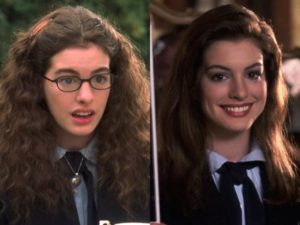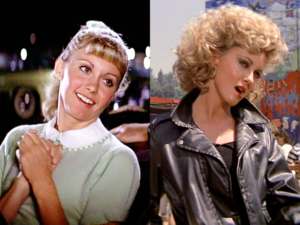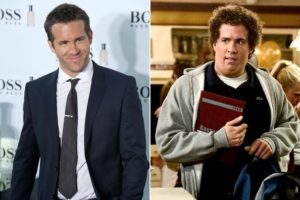
There’s something satisfying about movie makeovers that leave us wanting more, every time. We love them, we grew up on them, and whether it’s a secret or not, we want to get one ourselves. Scenes like these are all fun and games, to be enjoyed with a bucket of popcorn, but their effects on young men and women are far deeper than one might notice.
The list of iconic makeovers in movies seems to be never ending, ranging from Grease (1978) to The Princess Diaries (2001), and from Clueless (1995) to even the classic Disney Movie Cinderella (1950). It also applies to male makeovers and transformations too like the ones seen in Crazy Stupid Love (2011) and Just Friends (2005). One of the things these films all have in common is the theme that people have to change their appearance in order to get the person they love, get the job, or get the popularity. The idea that the makeovers are planting into the minds of younger viewers is that their natural, comfortable self isn’t enough, and they need to become someone else. Feeling that way simply because of watching a feel-good movie someone adores can be incredibly detrimental to their self-esteem, which can lead to more severe consequences for their mental health.

Low self-esteem is a very negative trait to be living with. Having lower self-esteem because someone is hyper focused on becoming someone other than themselves can lead to increased anxiety, depression, drug abuse, and poor job performance among others. Think about the movie Just Friends starring Ryan Reynolds. Growing up, he was in love with his best friend, but she never bat an eye to him in a romantic way because he was severely overweight. Fast forward to when they are both adults, he is a transformed man in great shape who gets all the girls he could ever ask for. Even the best friend begins to look at Reynolds’s character differently. Viewers at home who may be in the same situation his character used to be in may feel that their weight is holding them back. This can lead to someone falling into eating disorders to lose weight. In some severe cases, low self-esteem is also closely related to suicidal tendencies. It’s hard to imagine these negative and intense things can arise because of a movie, but the reality is that they can, especially if viewers are fed the exact same themes over and over again with every makeover movie they watch.

For viewers of these beloved and well-known movies, their entertainment subconsciously picks away at their mental health. Makeover scenes make them believe that if only they looked a different way, they could be happy, just like the characters did. It’s the magic of makeovers that help people be happy and successful through a new hairstyle, some makeup, fancy clothes, and taking off glasses, right? Slowly but surely, our romantic-comedy guilty pleasures have turned our minds into our own worst enemy.








The iconic makeovers in these movies used to be my favorite part of the 2000s movies. However, in reality, a simple makeover without wearing glasses or having frizzy hair doesn’t fix anything. Currently, we live in a society that strives for perfection in beauty on social media. Some individuals use Photoshop so they can look flawless. While others use plastic surgery to change the way you look permanently. However, it is temporary to strive for beauty and to look like the ideal type of beauty. It makes young girls and women have self-esteem and mental health problems. There should be more value in movies/ television on the importance of people’s personalities. But how would any movie or show profit off boring personalities when beauty brings in the money?
Hey Taryn,
I really liked reading your article and loved your points about movie makeovers and their effect on people’s self-esteem/psyche. As a movie lover and fan of films like The Princess Diaries and Clueless, I actually really enjoyed watching the makeover scenes because of how fun they were and seeing the end results of everything. I agree that the messages these scenes create can harm a person’s psyche and way of viewing themselves. However, I think that more than the makeover scenes themselves being the issue, I feel like it’s the messages that the film producers are trying to put across through these scenes that are truly detrimental to many young children and their viewings of themselves. I think having a makeover can be extremely fun and beneficial to a person IF they do it for themselves and their own confidence/growth. I think that if someone wants to switch their look to strengthen their confidence/motivation in themselves, I don’t think it should be an issue that they want to “change themselves.” But the problem with most of these makeover scenes is that rather than getting them for the sake of growing in themselves, these characters are often getting them to fit into a social standard or for external reasons, which (I feel) is why so many of us equate getting makeovers as something we do to change our original mediocre selves. I think if the movies had focused more on showcasing these makeovers as something that the main character wanted to do for the sake of their well-being and improvement (not for the approval of others or to get something in return), then I feel like the message might have come across a bit differently. But because movie makeovers tend to have this kind of association with them, we can’t help but wonder as the audience if we need to change something about ourselves for x-y-z reasons.
Hey Taryn,
I hadn’t thought about the consequences of what movie makers can do, like how you perfectly explained. I am not sure if it is because we have been watching it since we were little, or because there seems to be so many, that it is now normal. What seems unusual to me, is how we blame influencers and other individuals for doing the same thing, but still watch movies like this, knowing very well what it means. Like I said before, I think we all know that this idea of having to change the way you look or the way you are for someone to like you, is giving us as a society a negative look on not only ourselves, but others as well. Even then however, we still decide to glamorize the idea of makeovers and watch these movies which sometimes makes them famous, which makes movie studious want to make more. So whose fault is it really at the end of the day?